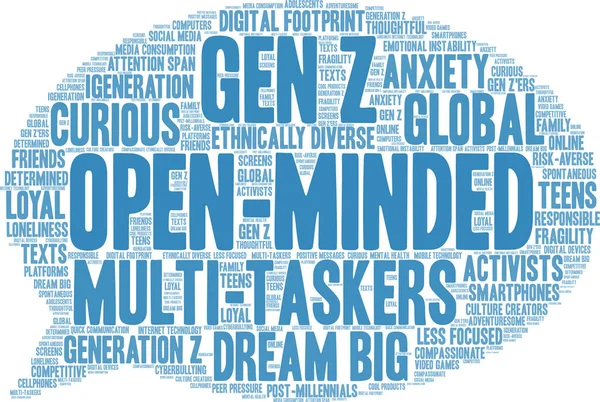Gen Z (born between 1997 and 2013), grew up with technology, internet with ready access to vast, global information. This has impacted their way of social interaction, communication, socialization, emotional well-being and regulation. This access to world news, diversity, people, other socio-economic and political events have created unique experiences that had an impact on their outlook towards the world and future. Although the access has its positives where the exposure created individuals who are flexible, accepting, tolerant; with an importance towards diversity and equality; it also came with unique mental health challenges. Although on the outside it might feel like the current generation of children are living in a safer and more advanced space with opportunities; they are equally grappling with a lot of mental health challenges, political and economic instabilities and future uncertainties.
Unique experiences of Gen Z
Compared to previous generations, Gen Zs report the highest levels of stress, anxiety and depression. Series of surveys conducted by Deloitte in 2022 and McKinsey in 2020 show that 46% of Gen Zs are stressed and anxious most of the time and one in four Gen Zs report going through emotional distress. The pandemic and the state of the world has only contributed to their mental health issues; which will be discussed in the following sections.
- Common Shared Experiences: We have historically seen the effects wars and great depressions had on people. Wars have led to significant mental health issues like PTSD, depression, hopelessness, lack of purpose, existential crisis, cynicism etc. If we look at it closely, the literatures written during and after the wars reflect them. Some events that the current generation have shared are the recession in 2007-2009, the current layoffs that are going on, the COVID-19 pandemic, cyberbullying, the environmental crisis that has led to ‘climate anxiety’, war in Ukraine, inflation, widening income gap, the looming threat of nuclear war etc. Access to all these events in real time, has led to anxiety over their future, job prospects, stress, financial instabilities, skyrocketing prices and stagnating salaries and It has created a sense of nihilism. We can very clearly notice a shift in their language and jokes; characterized by dark humor, hyperbolic language, which is expressed in memes as well. Although Gen Z strive to make changes and rally for causes they believe in; they also feel a sense of loss of control over achieving change.
- Financial security: According to the survey by Deloitte in 2022, 29% of Gen Zs struggled with their housing, bills and transport costs with half of them living paycheck to paycheck. 26% are not confident they can retire And 43% of them have a second part time or full-time job. This has led to a lot of financial anxiety; with 46% of them feeling burnt out and 44% of them leaving due to higher workloads (Deloitte, 2022).
- Social Media and Smartphones: Another aspect that has caused significant load on mental health is social media and smartphones. Social media and smartphones have changed social interactions decreasing face-to-face social interactions, social play especially in children impacting their social and emotional development. This has decreased their ability to make face-to-face conversations, social skills, emotional regulation etc. Physical play and messy play that develop core strength, endurance (help in reading and writing), creativity and imagination respectively are lost as well.
Cyberbullying, low self-esteem, feelings of inadequacy and body image dissatisfaction because of the filtered, positive and perfect posts is another outcome of social media. Lack of concentrate due to frequent notifications, disrupted sleep circadian rhythms due to the white light from screens, the loss of balance between virtual and face-to-face communications are some other important outcomes with huge repercussions. Hence, not being able to access social media can make them feel left out, experience FOMO, loneliness etc. which can lead to emotional attachment with social media and smartphones (Moscrip, 2019).
Emotional Regulation: Emotional regulation is another aspect that has huge influences on an individual’s mental health. Emotional regulation is learnt from interactions and imitations from their environment. Emotional attunement from parent to the child’s emotions can act as an experience for the child to realize how they can regulate their own emotions; which might be lost due to heavy smartphone use and/or full-time dual working families. Emotional contagion is another aspect; where an emotion expressed on social media influences similar affect in others; sometimes without awareness (Moscrip, 2019).
- School and Workplace Stressors: Gen Zs are very sensitive towards racial and gender inequalities, diversity etc. Positive, diverse environment, societal contributions of the company, focus on mental health of the employees, flexible working hours are all things that Gen Zs hold in high importance in the workplace. Work satisfaction, loyalty to the company depend on these factors (Deloitte, 2022). Coming to stressors faced in school; academic stressors related, fear of failure (because our education system is merit based), internal and external pressure for grades, excessive load of assignments, competition all contribute to academic stress and burn The pandemic has also led to a lot of learning gaps; which have led to loss of foundations, because of which understanding in class have reduced. This in turn leads to loss of interest, motivation, heightened exam stress, low global self-esteem and learned helplessness if the gaps are not bridged. Interpersonal difficulties are also another area which has its influence on other realms. Covid-19, lockdowns and loss of peer interactions has led to gaps in social skills, one’s ability to make conversations and friends. This has caused significant stress in school; with effects on their academic performance as well.
Recommendations: Through the lens of Positive Psychology
It is imperative that we focus on positives realistically among the negativity they see and experience. With all the negativity and mental health concerns, individuals become passive to their circumstances; even when they can cope and solve them. And this sense of nihilism, hopelessness and mental health concerns might be clipping the wings of a powerful generation with a lot of potential, opportunities and changing power in their hands. They are the future and they can change it for the better; because they are the most empathetic, accepting and liberal minded generation of all. And a good place to start is with implementing positive psychology aspects in schools and workplace. Fostering and catering a week or day for gratitude (gratitude letters, gratitude journals), counting blessing, identifying their own and each other’s strengths etc. can help them get a balance; by realizing all the positives around them and the world.
Mindfulness practice sessions can help them regulate their emotions. Acceptance, non- judgmental, present focused aspects of mindfulness can help them be in their present; rather than past or future. Rumination and overthinking leading to distress is a common aspect we notice among Gen Z; hence, mindfulness can help them stay in their present; just observing instead of engaging with their thoughts. With emotional distress, stress and anxiety; the amygdala is overstimulated which can lead to burn out. And during this distress our prefrontal cortex’s important function of impulse control and reducing unnecessary stress reactions may become subdued; called an amygdala hijack. Mindfulness can bring changes in not only function but also structural changes (in grey matter); that help in diminishing the amygdala’s response to stressors and make prefrontal cortex more active; effectively helping an individual regulate their emotions and appropriately respond to the situation at hand.
Positive emotions can also help individuals counteract the effects of negative emotions. It’s logic that when a person believes there is no hope and are helpless; they will be passive and not make any effort to deal with the situation appropriately (if possible; problem solving or emotional coping). While positive emotions can help an individual believe there can be change (hope and optimism); and might put in action towards that. This not only applies to societal problems but also to individual specific concerns. This is exactly what Fredrickson (1998) said in her Broaden-and-Build theory. That positive emotions can make way for broadening thought- action-repertoires; where they build on cognitions and actions that help in responding to emotional distress/anxiety etc. As a result of this they create social support systems and other resources of identifying adaptive coping mechanisms that help them and on which they can bank on in the future. While negative emotions take you in a downward spiral.
Capitalizing on this in schools and even workplaces can help in maintaining safe space, helping them make agreed goal-oriented actions, develop a growth mindset; which can even reduce turnover and resignation rates in companies. Taking an amalgamation of emotion focused coping and goal-oriented problem-solving approach can help them make actual necessary changes. Problem solving, good decision making can be possible once emotional distress, optimism and hope is present. Afterall the world is theirs to make and we can support them in making it healthy, safe and beautiful.
References
Deloitte. (2022). Striving for Balance and Advocating for Change: The Deloitte Global Gen Z and Millenial Survey.
Moscrip, A. N. (2019). Generation Z’s Positive and Negative Attributes and the Impact on Empathy After a Community-Based Learning Experience. Retrieved from University of North Florida Digital Commons: https://digitalcommons.unf.edu/etd/908
(The above article is authored by Aaradhana Reddy, Counselling Psychologist, Hyderabad, Telangana)


